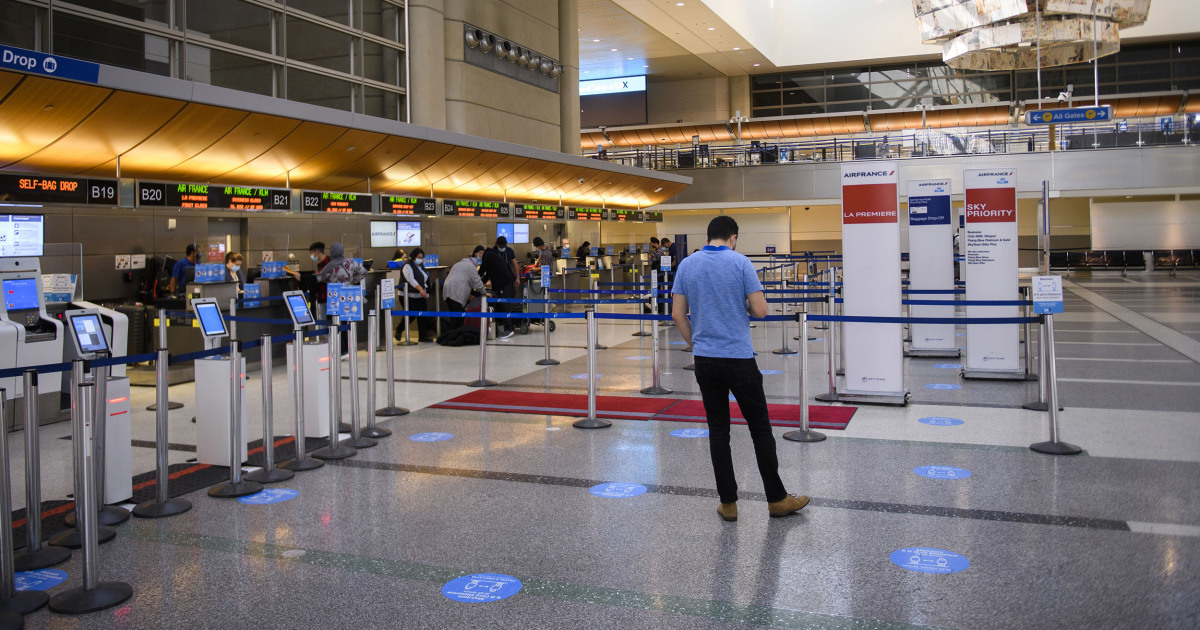
With more than 100 million people in the U.S. having been vaccinated, a growing number of Americans looking to escape the confines of a year at home are booking plane tickets, despite warnings from public health officials that travel should still be avoided.
With very low reported in-flight transmission rates, airlines have been steadfast about affirming the safety and hygiene of air travel during the pandemic.
But with a coming surge in travelers — many of whom may spend more time on the ground than on planes — are the country's airports equipped to handle the throngs?
The Transportation Security Administration screened more than 1 million passengers a day last week, an increase of more than 27 percent over the previous three weeks. While that is positive news for the airline industry, whose passenger traffic has plummeted by 60 percent in the last year, it could be the start of a logistical challenge for airports.
"The crisis isn't over, but we certainly are seeing what looks like the beginning of a very large uptick," American Airlines CEO Doug Parker said in a JPMorgan Chase virtual conference Monday.
Southwest Airlines CEO Gary Kelly echoed that optimism at a Washington Post event after the conference, saying, "With vaccine numbers going up and case numbers going down, there's a light at the end of this very long tunnel."
Airports have a vital role to play in stopping the spread of the coronavirus, according to a recent study from the Harvard T.H. Chan School of Public Health, which said "ventilation, physical distancing, behavioral and other issues may need to be further addressed" as the number of travelers ticks up.
The risk- and science-based precautions already in place to combat the spread of the coronavirus "significantly contribute to the risk reduction of Covid-19 transmission in airport settings," the study said. However, "if you must fly, or choose to fly, you should make a Covid plan that includes the recommendations for passengers" outlined in the report.
Sensors can assess queue lines in security, customs and immigration areas, signaling the need for ventilation system adjustments.
An obvious, yet important, piece of that plan is to wear a mask. It is federally mandated at all airports, even with the lifting of rules in some states. Another is rapid viral testing at airports, which can "quickly and efficiently identify those with infections and stop them from undergoing activities that could expose others, including potential travel," the report said.
The study urges airports to continue using only cleaning agents approved by the Environmental Protection Agency to disinfect surfaces by hand, and it notes that some of the electrostatic spraying and ultraviolet radiation disinfection devices being rolled out are still being evaluated for effectiveness.
"The number of air changes per hour that are appropriate for comfort needs may be insufficient to protect against airborne infections, especially in congested areas," researchers said.
Passengers should also expect new technology in airports, including smartphone apps that can alert them when it is their turn to go through security screening.
"Once beyond the security checkpoint, travelers can receive 'just in time' notification of boarding, avoiding congestion in the gate area," the study said. "Sensors can assess queue lines in security, customs and immigration areas, signaling the need for ventilation system adjustments."
Health experts recommend that passengers hold on to their luggage rather than check it — which avoids having to face a sea of strangers at the luggage carousel upon landing — but if bags do have to be checked, travelers should use airlines' apps, which will enable contact-free drop-off at luggage kiosks.
Ultimately, passengers have their own role to play in preventing the spread of the virus as they make their journeys.
"Airports will continue to communicate these important messages to their passengers and workers," said Scott Elmore, a spokesman for the Airports Council International-North America.
Christina Cassotis, CEO of the Allegheny County Airport Authority, which oversees Pittsburgh aviation, said: "It doesn't matter how clean the plane is if the airport isn't clean and healthy. The entire industry is interrelated."
https://ift.tt/2P00cSV
Business
Bagikan Berita Ini














0 Response to "Can airports meet the challenge of a surge in summer travelers? - NBC News"
Post a Comment